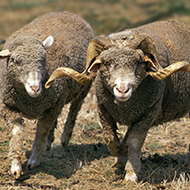
Map is one of the highest resolutions in a livestock species to date.
Scientists at the University of Edinburgh’s Roslin Institute have built a genetic map of sheep that could aid understanding of key traits liked to health and food production.
The map, published in the journal Frontiers in Genetics, is one of the highest resolutions in a livestock species to date and can be used for studies into sheep health, welfare nutrition, resilience and productivity.
Researchers say that outcomes from the project could also be used to investigate how specific regions of the sheep’s genetic makeup affect their physiological and physical characteristics. The study was conducted in collaboration with an international team, as part of the Ovine Functional Annotation of Animal Genomes (FAANG) project.
Dr Emily Clark from the Roslin Institute, said: “Sheep are hugely important farmed animals, providing a key global source of meat and fibre. The high-resolution annotation of transcription start sites in the genome that we have generated for the Ovine FAANG project will give scientists a better map of the genome upon which to base their studies.”
The map was built from a single Rambouillet sheep, a breed known for its high-quality fleece and for being able to live in harsh conditions. Using a technique called ‘Cap Analysis Gene Expression’ (CAGE) sequencing, researchers were able to identify points in the genome where the process of switching on genes starts – known as transcription start sites.
Dr Brenda Murdoch, coordinator of the Ovine FAANG Project, University of Idaho, explained: “This research identifies the location and regulatory elements of genes that control economically important traits like health, meat and wool quality in sheep. It is this type of information that is essential to help breeding programmes select and predict traits to improve the sustainability and productivity of this globally important species."



 RCVS' Mind Matters Initiative (MMI) has launched round two of its veterinary mental health research grants.
RCVS' Mind Matters Initiative (MMI) has launched round two of its veterinary mental health research grants.